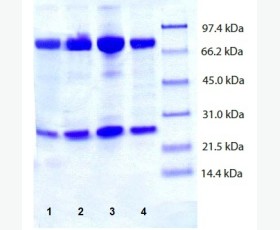Recombinant Human Brain-Derived Neurotrophic Factor/BDNF
| Product name: | Recombinant Human Brain-Derived Neurotrophic Factor/BDNF |
| Source: | E.coli |
| Purity: | Greater than 95% as determined by reducing SDS-PAGE. |
| Buffer Formulation: | Lyophilized from a 0.2 μm filtered solution of 20mM PB, 250mM NaCl, pH 7.2. |
| Applications: | SDS-PAGE, Western Blot (WB), ELISA (EIA), Immunoprecipitation (IP) |
| Storage: | Avoid repeated freeze/thaw cycles. Store at 2-8 degree C for one month. Aliquot and store at -80 degree C for 12 months. |
| UOM: | 100ug/50ug/200ug/1mg/1g |
| Source | E.coli |
| Description | Recombinant Human Brain-Derived Neurotrophic Factor is produced by our E.coli expression system and the target gene encoding His129-Arg247 is expressed. |
| Names | Brain-Derived Neurotrophic Factor, BDNF, Abrineurin |
| Accession # | P23560 |
| Formulation | Lyophilized from a 0.2 μm filtered solution of 20mM PB, 250mM NaCl, pH 7.2. |
| Shipping |
The product is shipped at ambient temperature. |
| Reconstitution |
Always centrifuge tubes before opening. Do not mix by vortex or pipetting. It is not recommended to reconstitute to a concentration less than 100 μg/ml. Dissolve the lyophilized protein in ddH2O. Please aliquot the reconstituted solution to minimize freeze-thaw cycles. |
| Storage |
Lyophilized protein should be stored at < -20°C, though stable at room temperature for 3 weeks. Reconstituted protein solution can be stored at 4-7°C for 2-7 days. Aliquots of reconstituted samples are stable at < -20°C for 3 months. |
| Purity |
Greater than 95% as determined by reducing SDS-PAGE. |
| Endotoxin | Less than 0.1 ng/µg (1 IEU/µg) as determined by LAL test. |
| Amino Acid Sequence |
MHSDPARRGELSVCDSISEWVTAADKKTAVDMSGGTVTVLEKVPVSKGQLKQYFYETKCNPMGYT KEGCRGIDKRHWNSQCRTTQSYVRALTMDSKKRIGWRFIRIDTSCVCTLTIKRGR
|
| Background | Brain-Derived Neurotrophic Factor (BDNF) is a member of the neurotrophin family. Along with other structurally related neurotrophic factors NGF, NT-3 and NT-4, BDNF binds with high affinity to the TrkB kinase receptor. It also binds with the LNGFR (for low-affinity nerve growth factor receptor, also known as p75). BDNF promotes the survival, growth and differentiation of neurons. It serves as a major regulator of synaptic transmission and plasticity at adult synapses in many regions of the CNS. BDNF expression is altered in neurodegenerative disorders such as Parkinson's and Alzheimer's disease. |














